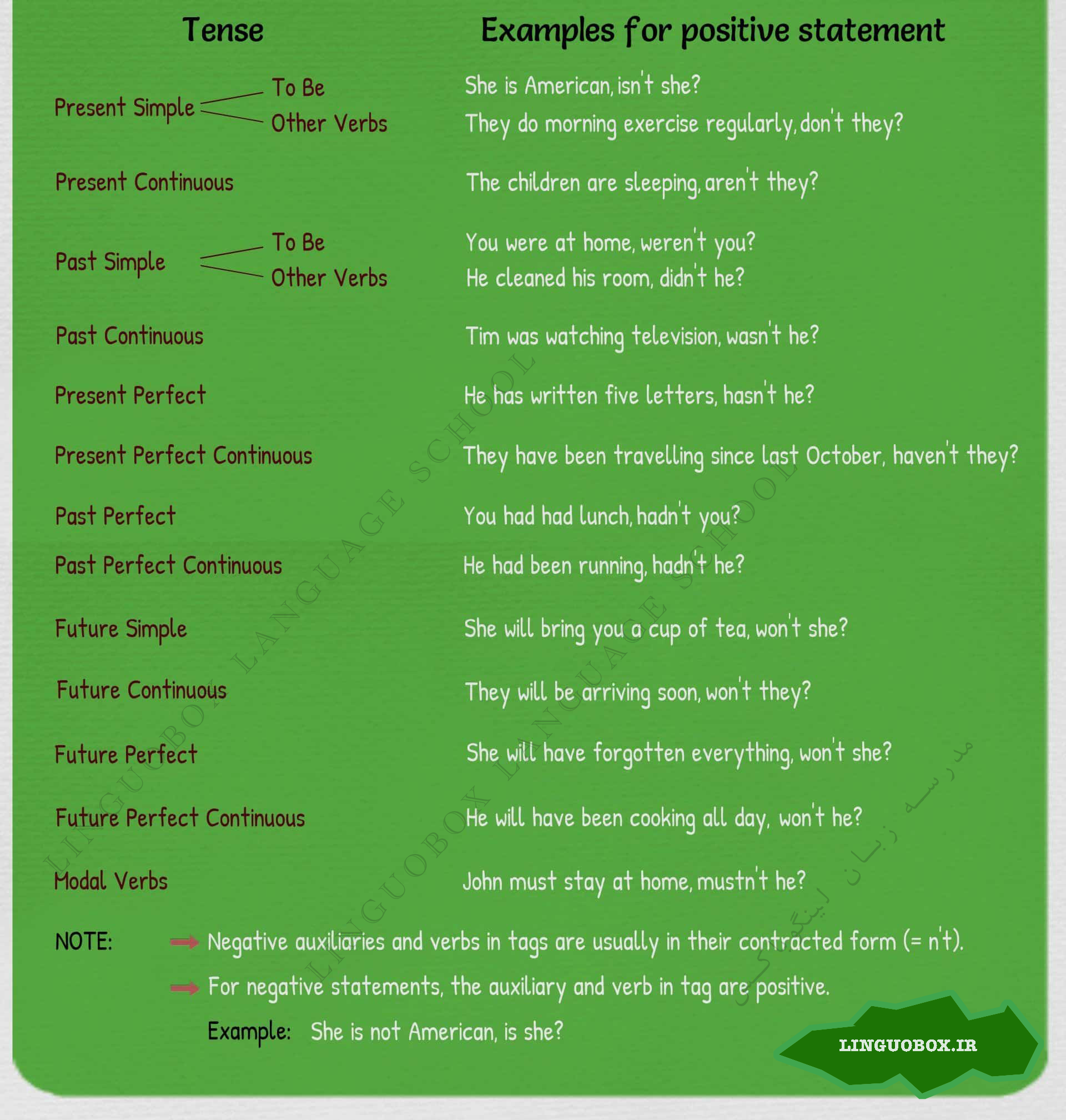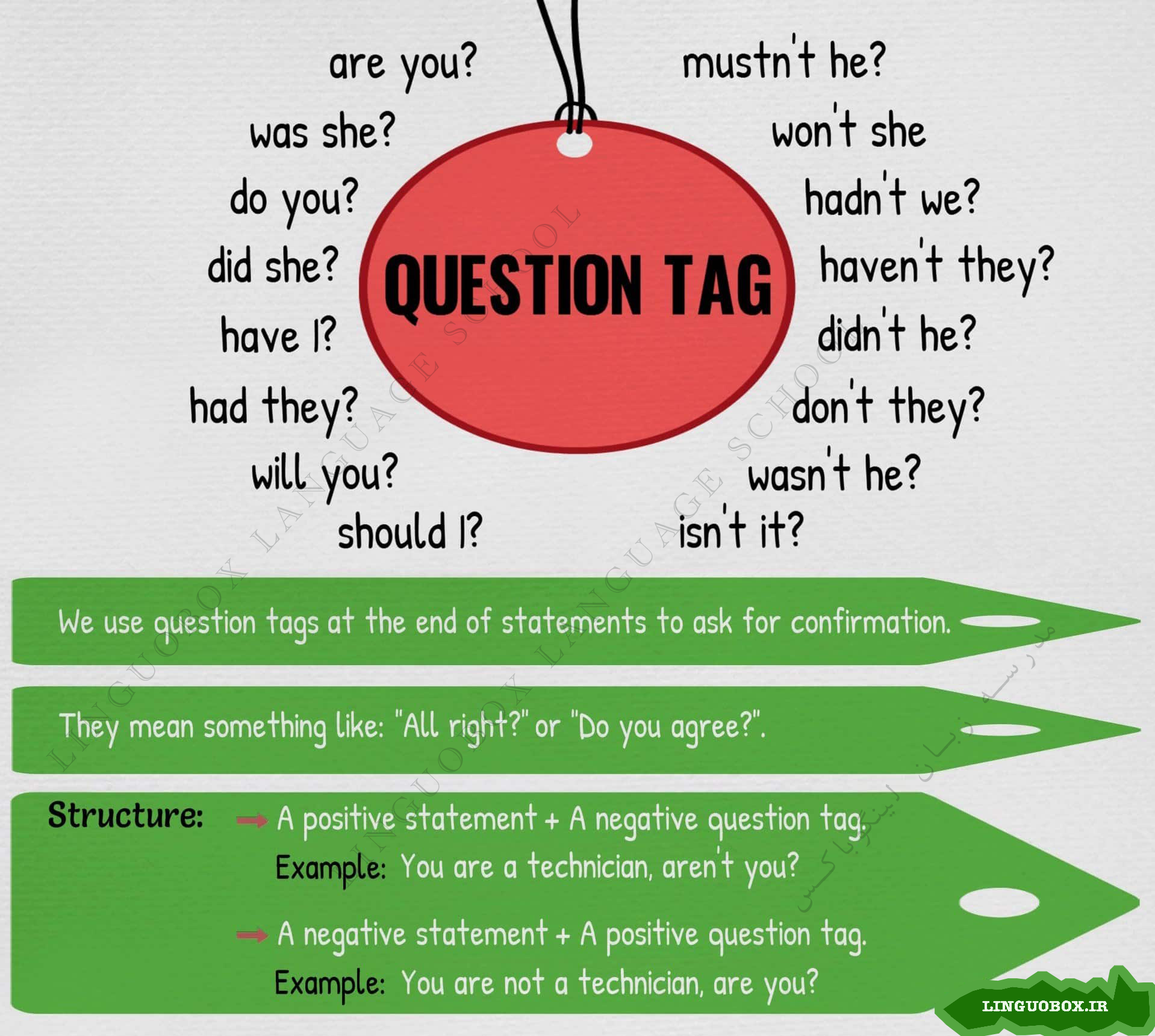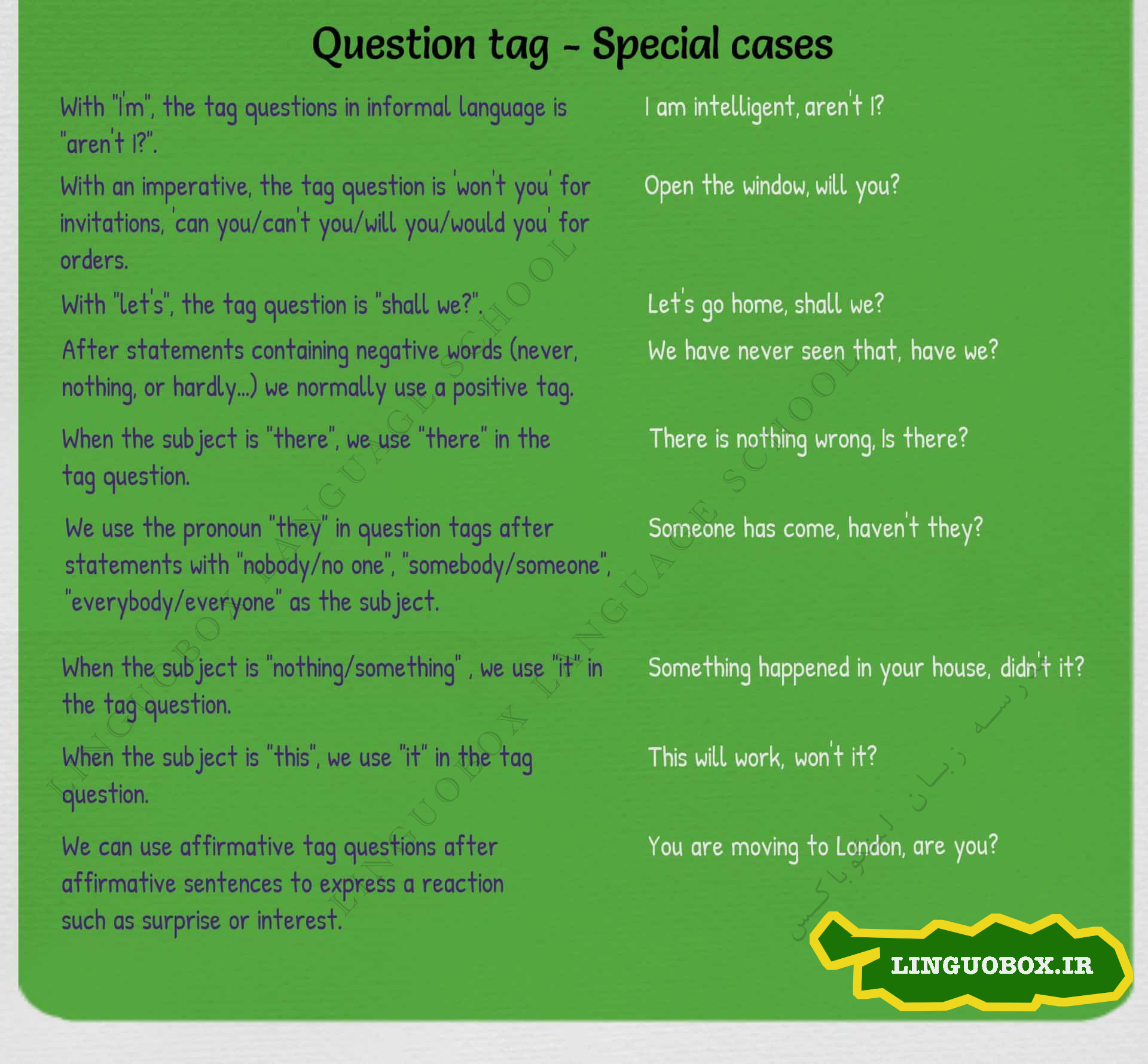Tag Questions



Tag Questions
Tag Questions
Introduction
A tag question is a small question that is attached , or "tagged", to the end of a sentence. Rather than repeat the main verb, a form of "be" or other auxiliary verb or modal is used in the tag. Below are a few examples.
You came by train, didn’t you?
It’s very windy today, isn’t it?
You can meet me at the station, can’t you?
You couldn’t give me a ride, could you?
Sentence Pattern
If the sentence is negative, the tag is usually positive, as in the example below.
You didn’t tell him, did you?
Note: Sentences with negative words are considered to be negative. Therefore, they require positive tag question endings, as in these examples:
He never drinks alcohol, does he?
Nobody left a message, did they?
If the sentence is positive, the tag is usually negative, as in the next example.
You told him, didn’t you?
Twelve Rules for Tag Questions
Rule | Example |
1. After “let’s”, the tag begins with “shall”. | Let’s invite the neighbours over for dinner on the weekend, shall we? |
2. Use “aren’t I” in tags to mean “I am not”. | I’m on time, aren’t I? (correct) I’m on time, am’t I? (incorrect) |
3. Use “won’t” for polite request tags. | You’ll bring the other things, won’t you? |
4. Use “will” or “would” with imperative sentences (commands). | Wait here until I return, will you? Wait here until I return, would you? |
5. Use “mustn’t” with the modal “must”. | This must be the address, mustn’t it? |
6. Two endings are possible when “have” is the main verb of the sentence. | You have enough money, haven’t you? (British English) You have enough money, don’t you? (North American English) |
7. Use pronouns for people, not proper names, in question tags. | Paul is a good tennis player, isn’t he? Betty has a good job, hasn’t she? |
8. Use “it” in a question tag when the sentence includes the words “this” or “that”. | This is your pen, isn’t it? |
9. Use “they” in a question tag when the sentence includes “these” or “those”. | Those are your sandals, aren’t they? |
10. Use “there” in a question tag when the sentences includes “there + a form of be”. | There is a lot of work to do today, isn’t there? |
11. Use “they” in a question tag when the sentence includes indefinite pronouns (nobody, no one, someone, somebody, everyone, everybody). | Everyone is here now, aren’t they? Nobody has eaten yet, have they? |
12. Use “didn’t” in a question tag when the sentence includes the verb “used to”. | You used to go skating very often, didn’t you?” |
Using Tag Questions
Tag questions are used to ask for agreement or to ask for things, favours, or new information. To determine which, listen to the speaker's tone. A rising tone at the end of a tag question indicates that it is a real question. The speaker wants to know something or wants someone to do something. Falling tone however, means that the speaker is looking for agreement.
Rising tone - asking for a favour | You couldn't lend me some money, could you? |
Rising tone – asking for information | You don't happen to know if the No. 50 bus has already passed here, do you? |
Falling tone - asking for agreement | The boss wasn't in a good mood today, was he? That dress looks great on her, doesn't it? |
Note: We usually use a negative sentence with a positive tag to request things or information, as in the preceding examples.
Reference: continuingstudies.uvic.ca/elc/studyzone/410/grammar/410-tag-questions1
Forming tag questions
auxiliary verb + subject
- We use the same auxiliary verb in the tag as in the main sentence. If there is no auxiliary verb in the main sentence, we use do in the tag.
- You live in Spain, don’t you?
- If the auxiliary verb in the sentence is affirmative, the tag is negative.
- You’re learning Spanish, aren’t you?
- If the auxiliary verb in the sentence is negative, the tag is affirmative.
- You don’t speak Spanish, do you?
- If the main verb in the sentence is be (am, is, are, was, were), we use this in the tag:
- There is a lot of noise, isn’t there?
- You’re a little late, aren’t you?
Meaning
- We use tag questions to confirm or check information or ask for agreement.
- You want to come with me, don’t you?
- You can swim, can’t you?
- You don’t know where the boss is, do you?
- This meal is horrible, isn’t it?
- That film was fantastic, wasn’t it?
- We use tag questions to check whether something is true.
- The meeting’s tomorrow at 9am, isn’t it?
- You won’t go without me, will you?
Additional points
- In the present form of be: In an affirmative statement, if the subject is “I”, the auxiliary changes to aren’t in the tag.
- I’m sitting next to you, aren’t I?
- I’m a little early, aren’t I?
- With let’s, the tag is shall we?
- Let’s go to the beach, shall we?
- Let’s have a coffee, shall we?
- With an imperative, the tag is will you?
- Close the window, will you?
- Hold this, will you?
- We use an affirmative tag after a sentence containing a negative word such as never, hardly, nobody.
- Nobody lives in this house, do they?
- You’ve never liked me, have you?
- When the subject is nothing, we use “it” in the tag.
- Nothing bad happened, did it?
- Nothing ever happens, does it?
- If the subject is nobody, somebody, everybody, no one, someone or everyone, we use “they” in the tag.
- Nobody asked for me, did they?
- Nobody lives here, do they?
- If the main verb in the sentence is have (not an auxiliary verb), it is more common to use do in the tag.
- You have a Ferrari, don’t you?
- She had a great time, didn’t she?
- With used to, we use “didn’t” in the tag.
- You used to work here, didn’t you?
- He used to have long hair, didn’t he?
- We can use affirmative tags after affirmative sentences to express a reaction such as surprise or interest.
- You’re moving to Brazil, are you?
Pronunciation
- If we don’t know the answer, it is a real question and we use a rising intonation with the tag.
- You don’t know where the boss is, do you? ↗
- If we know the answer and are just confirming the information a falling intonation is used with the tag.
- That film was fantastic, wasn’t it? ↘
Reference: eslbase.com/grammar/tag-questions
